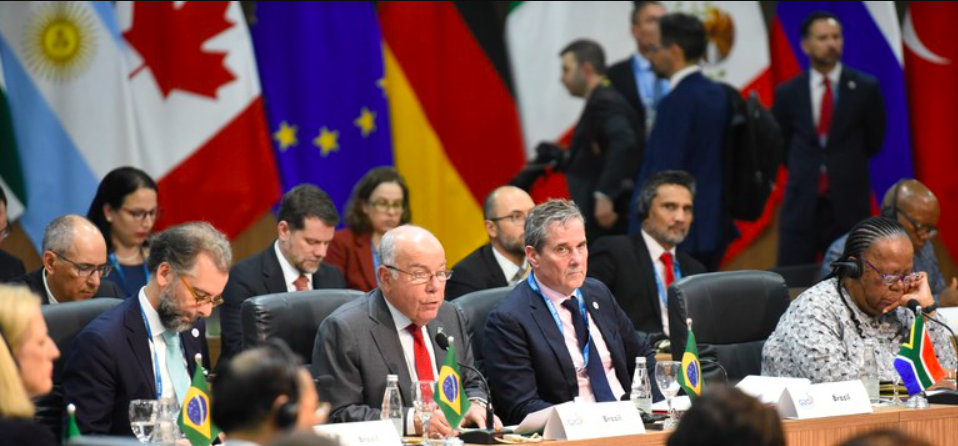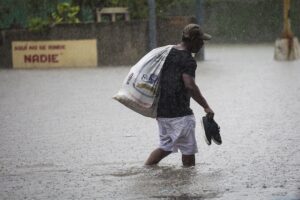
Published 02/21/2024 17:49 | Edited 02/22/2024 15:09
G20 foreign affairs ministers are meeting in Rio de Janeiro this Wednesday and Thursday, under the shadow of global conflicts in Gaza and Ukraine, as well as other less publicized crises such as that in the Democratic Republic of Congo (DRC). This meeting, marked by crucial discussions on global tensions and the improvement of multilateral organizations, is especially significant, given the context of challenges that the world currently faces.
In his welcome speech to the G20 foreign ministers, Brazilian Foreign Minister Mauro Vieira was emphatic in saying that the paralysis of the United Nations (UN) Security Council in the face of the record number of conflicts in the world, which he estimated at more than 170. (Read more below)
Brazil, which assumed the presidency of the annual G20 summit in December 2023, has placed global governance reform, the fight against climate change and poverty reduction as its priorities for 2024. President Luiz Inácio Lula da Silva has defended the expansion of the UN Security Council, a proposal that met with resistance among the permanent members of the Council, who have veto power.
A European diplomat highlighted that the meeting would serve as a moment to “let off steam”, aiming to boost multilateral reform and diagnose the problems faced by global organizations. This focus on multilateral reform reflects the growing desire of many countries for more equitable representation in global institutions.
In addition to discussions on conflicts and multilateral reform, the G20 meeting in Rio de Janeiro will also focus on combating poverty and hunger. The importance of Brazil’s experience with the “Bolsa Família” program is remembered internationally for managing to lift around 18 million families out of poverty and represents a potentially replicable model in African countries.
The G20, which brings together countries responsible for approximately 85% of global GDP and 75% of international trade, has a unique opportunity to positively influence the world’s most pressing issues. With themes ranging from global governance reform to the fight against hunger, the meeting in Rio de Janeiro could be a milestone in the search for joint solutions to global challenges.
Brazil’s stance on the international scene has recently been marked by controversies, especially after President Lula’s criticism of the United Nations’ inability to resolve the Israeli-Palestinian conflict. Lula’s accusations of genocide against Palestinians by Israel provoked a diplomatic crisis, leading to the recall of the Brazilian ambassador to the country.
The G20 meeting in Rio also promises moments of high diplomatic tension, with the presence of American Secretary of State Antony Blinken and Russian Foreign Minister Sergueï Lavrov. This will be the first face-to-face meeting between the two since a brief exchange last year in New Delhi, adding a layer of anticipation to the event. Chinese Foreign Minister Wang Yi will be absent.
Blinken on the Plateau
The meeting that took place today in Brasília, between President Luiz Inácio Lula da Silva and the American Secretary of State, Antony Blinken, anticipates some positions being debated in Rio de Janeiro. They discussed topics ranging from bilateral issues to complex global challenges such as the conflict in the Gaza Strip and the political situation in Venezuela.
Blinken opted for an approach focused on issues such as employment, environmental cooperation and the search for a peaceful solution to the Palestinian conflict, reiterating US support for the creation of an independent Palestinian state.
This visit by Blinken to Brazil, the first during Lula’s term, signals a strengthening of diplomatic relations, especially after Lula’s previous meetings with President Joe Biden in the United States.
In addition to geopolitical issues, the meeting also raised concerns about the upcoming elections in Venezuela and the threats of invasion of Guyana, delicate topics that require special attention and continuous dialogue. Brazil, under Lula’s leadership, has acted as a mediator in regional conflicts, seeking to avoid escalations of violence and promote peace.
In the environmental and economic sphere, discussions ranged from American support for the Amazon Fund to the energy transition and the strengthening of business forums. With their eyes focused on the G20 and beyond, Brazil and the United States are working together to build a more robust and meaningful strategic partnership.
United against global fractures
During the opening of the G20 foreign ministers’ meeting, Brazilian Foreign Minister Mauro Vieira set the tone for what promises to be a meeting marked by the search for solutions to global divisions and the reform of global governance institutions. Vieira highlighted the importance of the G20 as a platform for resolving differences and promoting peace.
Brazilian Priorities in the G20
The Brazilian chancellor highlighted the three main priorities established by President Luiz Inácio Lula da Silva: “the fight against hunger, poverty and inequality; sustainable development, in its economic, social and environmental dimensions; and global governance reform.” Emphasis was placed on the urgent need to reform global governance, the central theme of the meeting.
The minister highlighted the growing relevance of the G20 as an international forum, capable of bringing together countries with different views for productive dialogues, overcoming the entrenched positions that often paralyze other forums, such as the UN Security Council.
Global Appeal Against Hunger
Vieira appealed to member countries to support the initiative of a “Global Alliance against Hunger and Poverty”a key priority of the Brazilian presidency, aiming to announce significant contributions to eradicating world hunger during the Rio de Janeiro Leaders’ Summit in November.
Discussions on Peace and Security
The minister drew attention to the role of the G20 in mediating international tensions, emphasizing that, despite the United Nations being the main forum for peace and security issues, the G20 stands out as a space where “countries with opposing views are still able to sit at the table and have productive conversations.”
Emphasizing the need for reform in global governance, Vieira also defended the adoption of peaceful solutions to conflicts, rejecting the use of military force as a means of resolving differences between nations. “Brazil does not accept a world in which differences are resolved through the use of military force… It is not in our interest to live in a fractured world”, declared the Minister.
Concern about Conflicts and Brazil’s Posture
Brazil’s concern with global conflicts was emphasized, pointing to the record number of ongoing conflicts – more than 170 – and the increase in geopolitical tensions. Vieira recalled the country’s history of seeking diplomatic solutions and building consensus, respecting the self-determination of the people.
Brazil, according to Vieira, maintains a unique position that allows it to discuss international tensions in any forum, having presented its views on the conflicts in Ukraine and Palestine in bodies such as the Security Council and the UN General Assembly.
Call for Concrete Action
Highlighting the imbalance between military spending and investments in development and combating climate change, the chancellor questioned the effectiveness of current actions in the face of existential threats. “I can’t shake the feeling that we lack concrete action on these issues,” declared Vieira, pointing to the urgent need to rethink global priorities.
Encouragement of Dialogue and Cooperation
Concluding, Minister Vieira encouraged G20 members to focus on dialogue and cooperation as a means of overcoming differences, rejecting the use of force and other practices contrary to multilateralism. “Brazil is ready to contribute ideas and concrete proposals in this regard,” he concluded, emphasizing Brazil’s willingness to lead efforts towards more effective and peaceful global governance.
This G20 meeting in Rio de Janeiro emerges as a crucial moment for international diplomacy, with Brazil positioning itself as a potential mediator in the search for joint solutions to the most pressing global challenges. Brazilian leadership at the G20 points to an era of diplomacy focused on building bridges between nations, in the hope of overcoming the fractures that threaten global stability.
Source: vermelho.org.br

